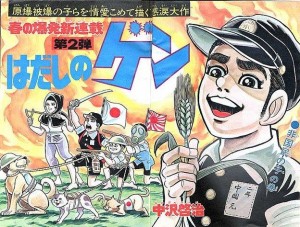 We’re slowly getting more details on last week’s news that Keiji Nakazawa’s manga Barefoot Gen had been banned from yet another Japanese school district. According to major sources including Asahi Shimbun and Mainichi Shimbun, Izumisano City officials planned to return the book to school library shelves last Thursday, following a review of the content.
We’re slowly getting more details on last week’s news that Keiji Nakazawa’s manga Barefoot Gen had been banned from yet another Japanese school district. According to major sources including Asahi Shimbun and Mainichi Shimbun, Izumisano City officials planned to return the book to school library shelves last Thursday, following a review of the content.
Izumisano mayor Hiroyasu Chiyomatsu ordered Gen removed from schools back in November, after he read it upon hearing about the previous ban in the city of Matsue. But while Matsue officials blamed gruesome wartime imagery for their removal of the book, Chiyomatsu cited “many discriminatory expressions” such as kichigai (madman) and kojiki (beggar). As an anonymous school principal pointed out, however, this justification rings a bit hollow as there are plenty of other books that contain potentially offensive terms but were not targeted for removal from school libraries.
After Chiyomatsu expressed concern in November about “many expressions in the manga that impact human rights,” his political ally and appointee Tatsuhiro Nakafuji, superintendent of Izumisano schools, passed a resolution to collect all 128 copies of the book from district libraries. Many schools refused to cooperate, however, so in January Nakafuji personally collected the remaining copies. Following this action, the local school principals’ association sent two letters of protest to the school board, saying that “[t]o deny children the chance to read the manga grounded in [a] certain sense of values and ideas is a violation of their human rights.”
In response to media coverage and protests from educators and citizens, the school board claimed that it had planned all along to only withhold the books until March 20, after making “preparations to provide guidance to students regarding the problematic expressions.” According to Mainichi, these preparations may include distribution of a list of phrases from the manga that students shouldn’t use. But as Asahi Shimbun pointed out in an editorial, simply pulling the words out of context and telling students they are nebulously “offensive” seems rather pointless:
What is necessary is not to scour books for inappropriate words with the intention of keeping them out of reach of children. It is important to help children understand why expressions that are better left unused today are used in certain literary works and why the authors used them. That requires careful efforts to give children necessary knowledge about historical backgrounds and useful perspectives.
If any of our faithful readers can provide further verified information on this story–particularly whether all copies of Barefoot Gen were in fact restored to Izumisano schools on March 20 as the school board had promised–please send tips to info@cbldf.org!